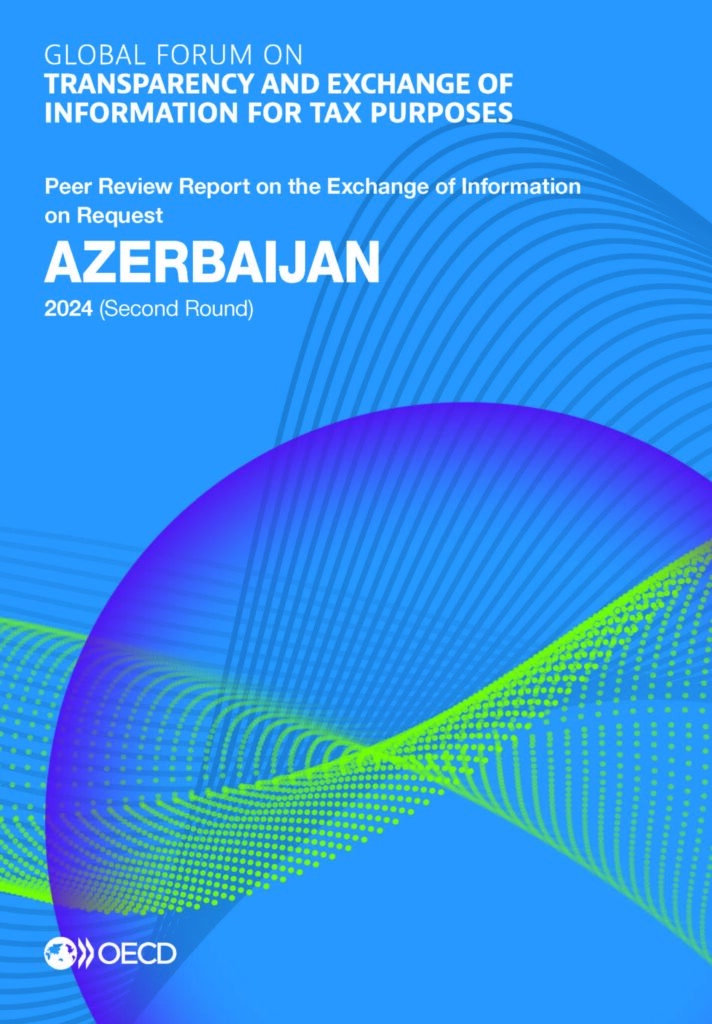21 November 2024

この報告書は、OECDグローバル・フォーラムによるアゼルバイジャンの税務透明性および情報交換(EOIR)基準の実施状況を評価する第2回目の審査結果をまとめたものです。
1. 審査の背景
- 審査は2024年7月4日時点で有効な法的・規制枠組みと、その枠組みの実施状況を基に行われました。
- 審査期間は2020年4月1日から2023年3月31日まで。
- グローバル・フォーラムの基準に照らし、アゼルバイジャンが全体として基準を「準拠」していると結論付けています。
2. 前回審査(2016年)以降の主な進展
- 会計情報の入手性
アゼルバイジャンは税法を改正し、企業が会計記録を保持する義務を明確化しました。また、違反に対する制裁が最長5年間適用されることが明確にされました。 - 銀行情報へのアクセス
当局の銀行情報へのアクセス権限を強化し、企業秘密の範囲も明確化しました。 - 無記名株式の管理
すべての株式会社が無記名株式を禁止し、株式をナショナル・デポジトリー・センターに登録するよう義務付けました。
3. 主要な勧告
- 名義株主および代理人契約
アゼルバイジャン法は、代理人が自己名義で株式を保有することを認めていますが、その身元開示義務が欠如しています。このため、名義人や代理人の情報開示を義務付ける法改正が推奨されています。 - 実質的所有者情報の整備
アゼルバイジャンでは、AML(アンチマネーロンダリング)義務者が唯一の情報源となっていますが、すべての関連事業体がAML義務者と継続的関係を持つ法的要件がないため、実質的所有者情報が十分に確保されていない場合があり、改善が必要です。
4. 情報交換の実務
- 審査期間中、アゼルバイジャンはパートナーからの情報要請(56件)のほぼすべてに迅速に対応しました。
- アゼルバイジャンからの情報要請(102件)は、基準に則って行われたと評価されています。
5. 総合評価
- 個別の要素に基づき、アゼルバイジャンは9つの要素で「準拠」、1つの要素で「ほぼ準拠」と評価されました。
- 総合評価は「準拠」とされています。
6. 今後の措置
- グローバル・フォーラムが出した勧告に基づき、アゼルバイジャンは今後の改善に取り組む必要があります。
- 初回のフォローアップ報告書は2026年に提出予定で、その後2年ごとに継続して提出されることを期待しています。
原文
Abstract
This report looks back at 15 years of tax and development work at the OECD charting the evolution of the OECD’s engagement with, and inclusion of, developing countries in its tax work from 2009 to 2024. Beginning with the restructuring of the Global Forum on Transparency and Exchange of Information for Tax Purposes in 2009, through the BEPS Actions, the establishment of the Inclusive Framework on BEPS and negotiations on the Two Pillar Solution to Address the Tax Challenges of the Digitalising Economy, it shows how OECD initiatives have combined the momentum for multilateral tax co-operation with the increased focus on taxation in international development, to develop a range of tools, instruments and forums with wide participation from developing counties. Accompanying the move to multilateralism in tax matters, the OECD has also sought to increase the availability of data on taxation, for example through the Global Revenue Statistics Database, and support more integrated tax and development policy thinking, for example on the taxation of development assistance. Concurrently there has been a continuous growth in the OECD capacity building activities, now reaching over 30,000 officials in over 100 countries annually. Notable among these initiatives is the groundbreaking joint OECD/UNDP Tax Inspectors Without Borders initiative. The report features several case studies highlighting the impacts across various countries, as well as the wide range of partnerships forged by the OECD to harness taxation’s potential in advancing sustainable development.
Executive summary
The crypto-asset market has grown rapidly over recent years. The growth in this innovative sector brings with it new economic opportunities and ways of doing business, as well as new ways for taxpayers (individuals and entities) to hide their income and wealth from the view of tax authorities and other regulators. This is because the increased use of crypto-assets involves a move away from more traditional financial institutions and financial products that have historically been the focus of regulation and tax reporting. Crypto-assets and the intermediaries that facilitate their use are only now becoming a focus of regulation through an increased emphasis on crypto-assets by the Financial Action Task Force (FATF). The risks in relation to the use of crypto-assets as a means to evade and avoid tax obligations are particularly acute when taxpayers hold the crypto assets offshore, such as through offshore intermediaries. Where financial activities that are relevant for tax purposes take place offshore, it is especially difficult for tax authorities from the jurisdictions in which taxpayers are resident to have visibility over the offshore income and wealth of their taxpayers to ensure that it is properly declared and taxed. This led to the development of the Common Reporting Standard (CRS), by the OECD working with G20 countries in 2014, which introduced the automatic exchange of information (AEOI) between tax authorities for tax purposes in relation to financial accounts maintained by the traditional financial sector, including information on the beneficial owners of financial accounts. If tax administrations do not have the same visibility in relation to crypto-assets, it will create incentives for some taxpayers to move their investments to crypto-assets, resulting in tax evasion and avoidance risks that exacerbate inequality, threaten to reduce the revenues available to governments to fund vital public services and undermine the trust the public has in public institutions and the financial system. It will also create distortions in financial markets, as it provides the crypto-asset sector with a competitive advantage compared to the more traditional financial sector. The issue of crypto-assets has therefore received increasing public attention, in developing and developed jurisdictions alike, alongside an increased focus by political leaders and law enforcement authorities. To address the tax evasion and avoidance risks created by the increased use of crypto assets at an international level, the OECD has worked with G20 countries to develop the Crypto-Asset Reporting Framework (CARF). The CARF is a framework to extend AEOI between tax authorities to the crypto-asset sector. This is to ensure that tax authorities from all jurisdictions are equipped with the information they need, including information on the beneficial ownership of crypto-assets, to properly subject the income and wealth held offshore to tax, in accordance with their jurisdiction’s domestic rules. This will help all jurisdictions address inequality and fund public services. The development of the CARF was strongly endorsed by the G20, which invited the Global Forum on Transparency and Exchange of Information for Tax Purposes (the Global Forum) to work to ensure the widespread implementation of the CARF around the globe. Having already delivered a commitment and monitoring process that has led to the widespread implementation of the CRS, the Global Forum is well placed to do the same in relation to the CARF. The Global Forum has already made significant progress in this work and is due to deliver its commitment process, including commonly expected timelines, by the end of 2024. This report provides an update on this work. It has been prepared by the Secretariat of the Global Forum to inform the discussions at the July 2024 meeting of the G20 Finance Ministers and Central Bank Governors, at the request of the G20 Brazilian Presidency.

